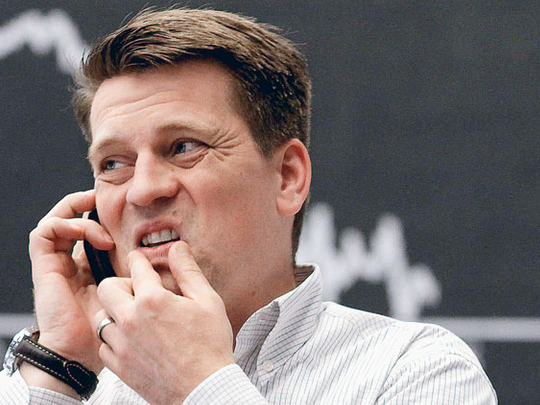
Berlin : Chancellor Angela Merkel reached out to financial markets ahead of today's vote on Germany's share of a $1 trillion (Dh3.67 trillion) bailout, saying she needs "honest" advice as her government presses for tougher global regulation.
Merkel, speaking at a Berlin conference on fin-ancial rules one day after enacting a unilateral ban on some types of naked short-selling, said that she has to balance voter concerns with investors' "understandable" desire for profit. While she said she's committed to holding the 16-nation euro area together, politicians are "no financial experts."
"People are asking, 'What powers do you politicians still have?'" Merkel said. The Group of 20 (G20) nations agreed every product, every actor and every financial centre must in future be regulated, she said. "That's what we promised the people. Now, one-and-a-half or two years later, people are asking what happened. At some point we have to deliver."
Merkel's speech contrasts with her previous condemnation of "destructive" markets and is her first attempt to explain the reasoning behind her decision to curb government-bond trading. The ban left her isolated as she pushes for a crackdown on euro- area states that flout budget-deficit rules and seeks lawmakers' backing for Germany's share of as much as 148 billion euros ($183 billion) to backstop the euro.
Under pressure
"Governments are under pressure," Thomas Mirow, president of the European Bank for Reconstruction and Development, told reporters at the conference. "Citizens in the various countries expect their governments to act. The danger is that everybody does what they attach most importance to and there is not enough European and international coordination."
Merkel was speaking at a conference hosted by her finance minister, Wolfgang Schaeuble, ahead of the G20 summit in Canada in June. She called on Canada and South Korea to get behind the regulatory drive. If countries don't act in unison, it's "extremely frustrating", she said.
Germany announced a unilateral ban late on May 18 on naked short-selling and speculation on European government bonds with credit-default swaps. Short sellers borrow assets and sell them, betting the price will fall. They would buy them later and pocket the difference. In naked short-selling, traders never borrow the assets, so betting is unlimited.
The euro fell as much as 0.5 per cent to $1.2144 on Wednesday as the ban was implemented, and dropped 0.6 per cent to $1.2333 yesterday in Frankfurt. The Stoxx Europe 600 Index sank 3 per cent on Wednesday to the lowest close since May 7. It dropped 0.4 per cent to 242.73 in London yesterday, after climbing as much as 1 per cent.
Investors betting against the euro are asking "to what extent will the euro area hold together," Merkel told the conference in Berlin. "In political terms, we've clearly answered the question: Yes, we're sticking together because this common currency is of such great importance to us, offers each member country so many advantages" and is a condition for Europe's common market to keep working.
Schaeuble will present a nine-point plan to his euro-area counterparts in Brussels tomorrow aimed at avoiding a repeat of the fiscal crisis touched off by Greece's budget deficit. It includes calls for faster budget cuts, tougher penalties for countries that flout the rules and the option of an "orderly state insolvency" for euro countries.
In Berlin the same day, lawmakers in both the lower house of parliament, the Bundestag, and the upper house, or Bundesrat, are due to vote on the euro bailout.












